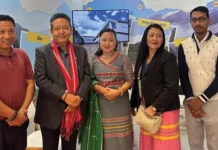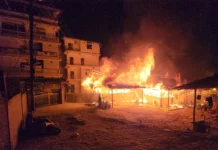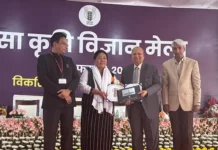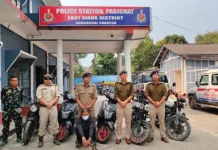TAWANG, 12 Jun: The 15-day nationwide campaign, Viksit Krishi Sankalp Abhiyan (VKSA), which commenced on 29 May from Khartooth village, culminated on Thursday on the premises of the Tawang Green Farmers Produce Company near Gankardung gonpa in Tawang district.
The campaign witnessed active participation from farmers, agricultural scientists, and officers from various line departments.
The campaign aimed to empower farmers through the dissemination of modern scientific knowledge and awareness about farmer-centric government schemes. Throughout the campaign, scientists from the Tawang Krishi Vigyan Kendra (KVK), Dirang (W/Kameng)-based National Research Centre on Yak (NRCY), and officials from departments such as Agriculture, Horticulture, Veterinary, and
Fisheries visited over 60 major villages across the district. They interacted directly with farmers, sharing information on welfare schemes and gathering on-ground insights through field visits.
Addressing the closing ceremony, Tawang KVK Head Dr Anjanand Tripathy highlighted the importance of bridging the gap between lab-based agricultural knowledge and field-based implementation, stating that the campaign provided a vital platform for direct engagement.
Kisan Morcha general secretary Dorjee Wangchu emphasized the need for timely and localized scientific training for farmers, and called for continued collaboration among departments to maximize impact.
Kisan Morcha general secretary Jambey Tenzin urged departments to involve Kisan Morcha members in the beneficiary selection process, noting their close connection with genuine farmers on the ground.
The programme concluded with the distribution of agricultural inputs to progressive farmers by the NRCY.
In East Kameng district, the campaign concluded at the KVK in Pampoli with distribution of soil health cards to selected farmers. Seeds of kharif crops were also distributed to the farmers.
In Upper Subansiri district, the campaign concluded at KVK-based in Maro and in all the blocks of the district.
In a district where terrain often challenges connectivity, the VKSA managed to connect over 7,101 farmers (37.06% males and 37.16 % females) across 472 villages, with nearly equal participation of men and women farmers.
The VKSA campaign aimed not just at information dissemination, but at reciprocal learning. Farmers received hands-on training on improved agricultural practices, while researchers gathered grassroots innovations and feedback that can now shape future research and extension strategies. One particularly practical indigenous innovation involved planting ginger around fish ponds to deter snake intrusion and prevent fish escape – highlighting how traditional wisdom can align with scientific intent.
During the programme the KVK exhibited different machineries and farmer-friendly tools and distributed different leaflets of agriculture and allied subjects, including centrally-sponsored schemes, 4, 300 soil health cards, and improved variety saplings like guava and litchi, and also displayed pre-kharif advisories for the benefit of the farmers.
In Dibang Valley district, the VKSA concluded after covering the remotest village in the district.
The KVK played a crucial role in making the VKSA successful in the district, working closely with the line departments, especially with the ArSRLM.
Throughout the campaign, teams of scientist and agricultural officers, along with krishi raths visited 28 villages in the district and conducted 29 to 30 outreach programmes.
The closing ceremony was held at Anini and Etalin village in the presence of Deputy Commissioner Pagli Sora and other officials from the district. The event also marked the inauguration of a weekly market and handloom emporium in the village.
Speaking at the event, Sora said that the weekly market would provide a platform for local vendors and artisans to showcase their products. The handloom emporium also offers a dedicated space for local weavers and artisans to display and sell their handloom products.
Dibang Valley KVK Head Dr Tsedar Wangmu informed that in a state where terrain often challenges connectivity, VKSA managed to connect over 1.25 lakh farmers across 1,560 villages.
A total of 2,045 farmers in 75 villages of both Lower Subansiri and Keyi Panyor districts benefited from the VKSA. The closing ceremony of the programme was conducted by Lower Subansiri KVK at Hija and Joram villages.
Speaking on the occasion, KVK Head Dr Hage Munth asked the farmers to go for crop rotation to increase the cropping intensity.
Plant protection scientist Nani Ampi spoke about organic management of white-backed plant hopper pest infestation in the paddy fields of Ziro valley. This was followed by an overview of various government schemes presented by line departments, and distribution of soil health card and seeds.
In Upper Siang district, the 15-day VKSA concluded in Geku.
The campaign had been launched by Deputy Commissioner Talo Jerang by flagging off the VKSA krishi rath.
Similarly, in Siang district, the rath had been flagged off by Rumgong MLA Talem Taboh, in the presence of Deputy Commissioner PN Thungon.
The krishi raths traversed the regions, disseminating vital agricultural information, cutting-edge technologies and high-quality seeds to remote areas, thereby enhancing both visibility and accessibility.
A total of 81 villages across the districts were covered, with 6,942 farmers directly benefiting from the initiative, which focused on empowering farmers with climate-resilient, region-specific and organic farming technologies, tailored to the districts’ distinct ecological profiles and their rich tradition of sustainable farming practices.
In Papum Pare district, the VKSA connected over 1.24 lakh farmers (54,421 males and 69,881 females), covering about 2,291 villages, with nearly equal participation of men and women farmers. The initiative cantered on equipping farmers with climate-resilient, region-specific, and organic farming technologies, recognizing Arunachal’s unique ecological character and its emphasis on sustainable farming traditions.
In Lower Dibang Valley district, the VKSA concluded in Bizari on Thursday. Forty-eight villages were covered by the campaign in the district.
Attending the concluding ceremony, Dambuk MLA Punyo Apum urged the officials concerned and agricultural scientists to ensure that benefit of both central and state government schemes reach every village and farmers are provided with knowledge of modern scientific technologies to enhance crop production “for a self-sufficient and self-reliant farming community.”
He encouraged the farmers to adopt latest technologies in farming.
Dambuk EAC Olom Panggeng also spoke.
Officials from allied departments briefed on the ongoing government schemes. Soil health cards were also distributed to the farmers on the occasion.
In Basar in Leparada district, MLA Nyabi Jini Dirchi attended the closing ceremony of the VKSA, which was held at Old Bam village.
The MLA in her address emphasised the importance of utilizing the various government schemes for livelihood improvement, and urged the farmers to adopt scientific technology developed by the ICAR and the KVK. She also urged them to “go for value addition and processing of horticultural crop, which save the wastage of crop and uplift the farmers’ income.”
Leparada DC Atul Tayeng, ICAR RC for NEH Region, Arunachal Pradesh Centre, Basar Head Dr Lobsang Wangchu and Farmers Society of Leparada president Nyaken Basar also spoke.
DAO Dare Kahi, DHO H Dirchi, DVO Dr H Riba, and DFDO J Karga also participated in the programme.
In Changlang, the final day of the nationwide VKSA witnessed enthusiastic participation of farmers, self-help groups, and various stakeholders across the district.
Subject matter specialists and experts from KVK Changlang, in collaboration with agri-allied departments and the district administration, mobilized extensive outreach across the Nampong block on Thursday.
Two teams were deployed, which covered the villages of Namgoi-1, Namgoi-2, Namgoi-3, Nampong, Therimkan, and Nongkey, besides Goju-1, Goju-2, Goju-3, Goju-4, along with Kusumpather-1 and Kusumpather-2 in Bordumsa circle of Changlang district.
The teams conducted awareness sessions on progressive agricultural practices, shared information on government schemes, and promoted farmer-centric innovations. The campaign also emphasized sustainability, productivity enhancement, and holistic rural development.
The campaign also concluded in other districts of the state. (With DIPRO input)





